

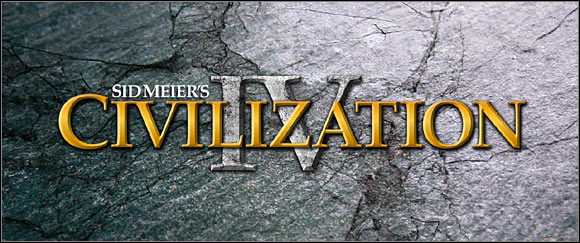
The following guide is not prepared for veteran players looking for highly advanced strategies, enabling them to perform things like winning in 100 turns. However, if you are a novice looking for rather basic information and guidelines, this text is just for you.
I hope of course that more advanced players find some interesting pieces of advice here, but my main objective was to help a beginner who has never played Civilization before.
I've assumed that reader knows the game's manual and knows how to use the Civilopedia so I've avoided copying information from both sources except when it was absolutely necessary.
Civilization IV is, as every game from the series, very complex and open ended. Your gaming experience is different every time you start a new game. That's why it's impossible to give any kind of strictly defined winning strategy - what may be a good choice in one game may lead to your quick downfall in any other one.
It is very important to learn how to plan every decision. "Focus" is the key word. Not only have you to know how to do something, but also why.
There are many tools in game which give you lot of important information about your empire and your competitors. The most useful one is the point ranking which makes it possible to compare your civilization to other nations.
Other tools worth remembering are your advisors (f1-f7) and statistics screen (f10) - use them often.
Last technical information: all numbers in this guide are based on a standard settings game (world size: standard, normal speed).
One of the most important factors of your success is level of infrastructure development. In CIV it is essential to control some well developed and highly advanced cities as foundations of every advanced strategy.
In CIV it is possible to specialise cities - focus them mainly on one function. It's not obligatory and especially on lower difficulties (up to noble) it is possible to win without even trying to specialise. It's very helpful nevertheless - as in real life focusing on some kind of activity can give a real advantage.
Despite the usefulness of specialization - it's simpler in theory than in real game. In most situations you will control some kind of hybrids, but knowledge how to focus cities on one function is very helpful.
There are three main kinds of specialisation - The Commerce City, The Production City and The Great People Factory.
The Commerce City - the main goal is to maximise commerce. Further it's possible to specialize into a research centre (emphasizes on science) or a financial centre (emphasizes on amount of income).
The Production City - your industrial centre, a place where you are able to quickly produce new units and raise expensive buildings (especially Wonders). Its main function is to build up your military and create some Wonders.
The Great People Factory - city focused on generating "Great People". It's possible to bias it on specific kind of GP. Moreover, due to big number of specialists it will generate a lot of science/commercial/cultural output - depends on sort of specialists.
The first step of raising a successful metropolis is finding a suitable place for it. You have to know what type of city you want to build from the very beginning. Different types of cities have different terrain preferences.
First of all let's look at general factors which we should consider when looking for the best place to start a city:
Good terrain for development - most obvious and most often used factor. The good idea is to avoid placing cities near other cities' terrain whenever possible - every part of territory already used by another city is useless for the new one.
Secure important resources - especially strategic ones. It's most important when it's likely that one of your competitors can overtake you in the race for this particular resource.
Military reasons - good placement is the best defence for the city. Bonuses form culture, buildings, terrain (hill and river) and eventually well planned units' promotions can make your city insurmountable castle.
Limiting your opponents' expansion - without Open Border Treaty no civilization can enter another one's territory without triggering a war. Well positioned city can cut off some big parts of a continent from your competitors' settlers - and save it for your own people.
Every specialized city requires a specific topography. Now I would like to give you some suggestions about what kinds of terrain are ideal for specific city types. As usual - a perfect terrain is a rather uncommon thing to find - so in most situations you will just have to use whatever you can find and make best use of it.
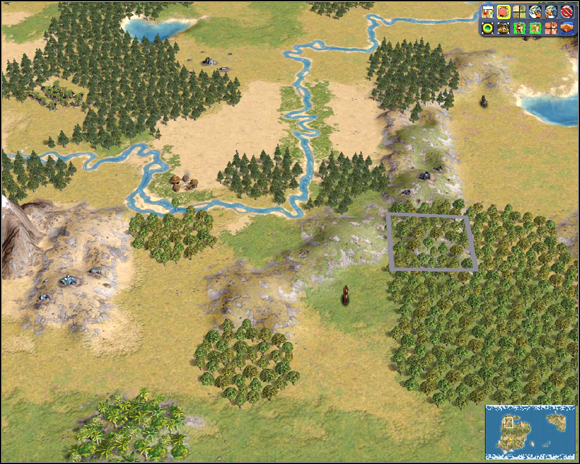 Plains, hills, forest. Ideal placement for future industrial centre
Plains, hills, forest. Ideal placement for future industrial centre
The Production City - a lot of hills, preferably forest hills and some grassland tiles, flood plains or (luckily enough) some Food resources. Strategic resources which are giving us Production bonuses - like iron, copper, stone or coal are extremely useful.
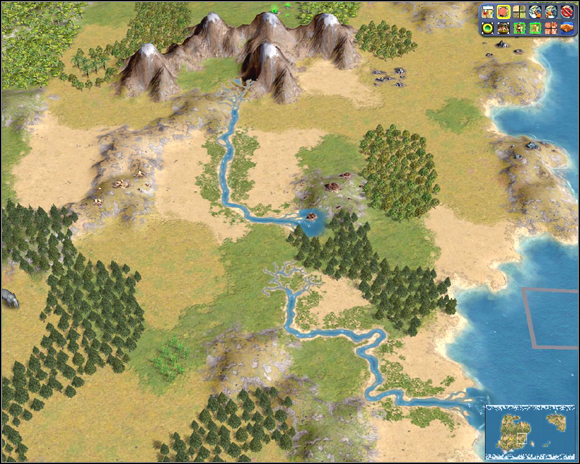 This landscape is more diverse. You have Gold, flood plains, but also forest (useful in limiting of negative influence of flood plains on health of our citizens) and two resources in reach.
This landscape is more diverse. You have Gold, flood plains, but also forest (useful in limiting of negative influence of flood plains on health of our citizens) and two resources in reach.
The Commercial City - a lot of grassland (possibly with forest) and flood plains. Some hills would be helpful, too. Luxurious resources are a nice addition, especially Gold, silver, gems or wine.
If your Leader has the Financial trait, the coastal city also can work as commercial city - with use of some nice commercial gains from sea tiles and really profitable sea trading. However, land city plays the role much better, even if it needs more time to develop.
Despite the type of city, you need to avoid situations when your commercial centre doesn't control any Production generating tiles. Even huge amounts of cash won't help if simple buildings are created in dozens of turns.
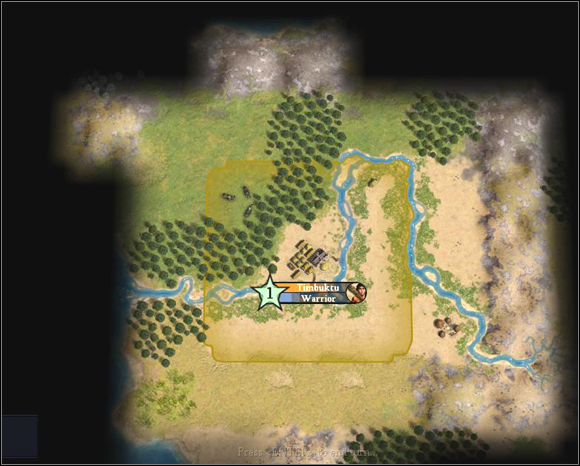 Here you have an example of perfect game starting position. Flood plains, a lot of trees and health resources. This city can definitely harvest huge amounts of Food - and that means it will be able to support a lot of specialists. This landscape can also work well in case of commercial city - but this time it will be The Great People Factory.
Here you have an example of perfect game starting position. Flood plains, a lot of trees and health resources. This city can definitely harvest huge amounts of Food - and that means it will be able to support a lot of specialists. This landscape can also work well in case of commercial city - but this time it will be The Great People Factory.
The Great People Factory - a lot of grassland near river or lake, one or two Food resources, flood plains. The key is to be able to support maximum number of citizens. With terrain improvements you try to maximize Food output.
The most valuable tiles are those near rivers (every tile adjacent to river has +1 Gold) but the most important is to have fresh water (river, lake, or oasis) on tile where we build city.
What is also important - the kind of resources that will be generated by the city tile doesn't depend on its type of terrain. It means that a city tile always gives you 2 Food, 1 hammer and 2 Gold, whether you build it on a desert, grassland or on a valuable resource. That's why the best place for the city is the hill (+25% for defence) surrounded by a river (gives another +25% and guaranteed fresh water and +1 Gold from all adjacent titles)
Building a city on a resource is in most situations a bad idea. You have access to this supply but loose a bonus from the tile where it is situated. There is one exception from this rule - if you are more interested in securing access to this resource than developing a particular city.
Flood plains are an interesting matter. They give you one of the best sources of Food, helping very much in quick growth of cities. On the other hand, it has negative influence on health level in the city. However, it is worth to pay this price, especially if you have forest (which works opposite) in the city reach - but you have to manage the growth of these cities carefully.
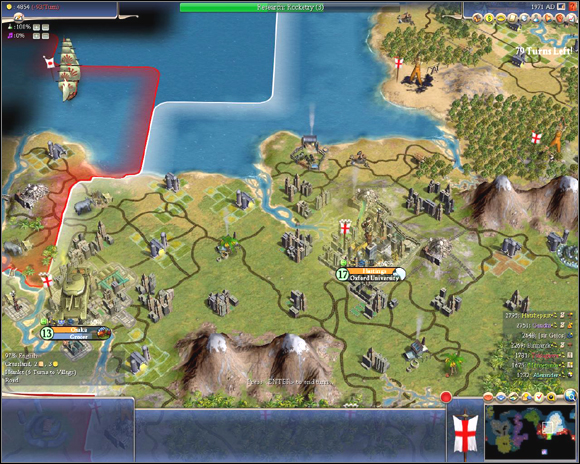 A typical coastal city. As we can see, there are same land improvements increasing Production output - it's very important especially when you want to produce same naval units.
A typical coastal city. As we can see, there are same land improvements increasing Production output - it's very important especially when you want to produce same naval units.
Case of coastal cities is a little bit more complicated. They have some major advantages and disadvantages:
Advantages:
Disadvantages:
That's why coastal cities are so specific. From my experience the best solution is to build cities next to deep and narrow natural harbours - ideally in deltas, limiting amounts of water tiles, maintaining sea access in the same time.
The next specific case is forest. Forest grows on one of four main type of terrain: hills, grasslands, plains and tundra. It's generating some of additional output functioning as a natural improvement (gives +1 to Production) what makes it one of the most useful early-game terrains. In addition, every city which has it in reach takes +0,4 health bonus for one forest.
The most important feature of the forest is the possibility of removing it. There's a worker action called "chop trees" which becomes available after inventing bronze working. Chopping the trees and removing the forest gives our nearest city a sudden Production bonus of at least 20-30, what can be extremely useful in situations when you are looking for the opportunity of rushing building of some units or buildings. The classical use of this trick is rushing a settler or Wonder, but it's useful in variety of situations.
So called chop rush, especially in extreme version is very a controversial strategy because you gain very significant addition to Production output for the price of loosing really useful terrain.
It's impossible to plant trees, and even the fact the forest is constantly expanding doesn't change the situation, as its growth is very slow and you haven't got any influence when and where it happens.
There are some ways of limiting the negative influence of this strategy for your empire. First of all, it is possible to chop trees outside of city reach and still receiving a Production bonus. It even works to cut trees growing outside your borders (but not in another empire's territory) and still receive this bonus. So, when you have a huge forests somewhere you don't plan to expand you may chop rush without any negative consequences.
The second situation when we can cut the trees without any remorse is building any improvements (except Lumbermill) at forest title. You simply give your workers an order to build improvements and he will cut the trees and build the structure in this same time. You will have a beneficial influence from this tile and bonus Productions - all in one.
The jungle is in some way opposite to forest because of its subtract amount of output from specific tile and gives health penalty. It doesn't give any benefits from being cut down except, of course, being removed.
You should improve landscape surrounding your cities as fast as possible - every improvement gives significant benefits for the city in which's reach is has been build. You shouldn't create too many extra improvements - the only functional are the ones which you intend to actually use.
It is done by creating workers in your cities and giving them proper orders. As a rule of thumb I propose to build one worker for one city - it should be enough except specific situations like rebuilding improvements pillaged in war, or after inventing important technology giving new specific and important improvements (like Railroad or Lumbermill).

In medium-game if you don't want to micromanage all workers it's a good idea to automate them. Before you do this I strongly recommend turning off the option allowing them to change already existing improvements.
As I've said the well placed city is first step of city specialization. The second step is to construct appropriate landscape improvements.
The Commercial City
Cottages. A lot of them. This is absolutely most important improvement to build. If particular city has even low but reliable Food surpluses, it's a good idea to create Cottages on every possible (and used) flat tile. Cottages are a very specific kind of improvement because it takes a lot of time to fully develop them into town (70 turns).
On hills you can put Windmills - they give some commerce and a good amount of Food.
Nevertheless it is good idea to leave some tiles only for Production improvements (Mines, Lumbermills, Workshops, Watermills). As I've said, even the most advanced city needs a few hammers - without them it will take ages to build all the useful buildings.
The Production City
Two types of improvements: farms and all Production enhancements. We start with mines and forest only so I advice avoiding chop rushing close to productive cities. In later game Workshop, Watermill and Lumbermill become available and can help us in generating more Production output.
Usefulness of Workshops is strongly connected with your technological advancement - at first this improvement is only useful when you have no other means of giving more Production to the city (no forest, no hills). After inventing Guilds and Chemistry Workshops become much more valuable.
The one of the most important Production improvements is Lumbermill (available with Replaceable Parts) witch gives +1 Production from terrain (forest) which already generates additional Production. Railroad is a very balanced (bonuses to health and usually some Food Production) improvement - this is the main reason to limit the chop rush.
The Railroads are very handy too. Lumbermills and Mines with Railroad has +1 to Productions which makes it's the most productive improvement in the game.
The Great People Factory
As I've said the intention of GPF city placement is to maximize of Food harvest. Every city's resident uses 2 Food, what means that to maintain specialists you need two residents working on grassland farm (generating 3 Food) for every specialist. That's why Food resources and flood plains in case of GPF are so important - they make it possible to have more specialists for less number of Food generating citizens.
In general the more residents city has, the better. Every citizen makes it possible to put him to work on next tile in city reach or to make next specialist - so, the number of citizens is strongly connected with your global Production, cultural, financial and research potential.
However, you should avoid uncontrolled city growth - too much new people in short time makes part of them unhappy because you don't have means to maintain order in city.
Following factors determine a maximum number of city's inhabitants:
A little more complex is the technology's influence on Food output:
As you see, most of these factors are directly linked with city placement, but there are also important global factors which can help a lot - but only if the city has appropriate terrain.
Happiness factors:
Every city's resident can be put into work on one of the 17 tiles in city reach.
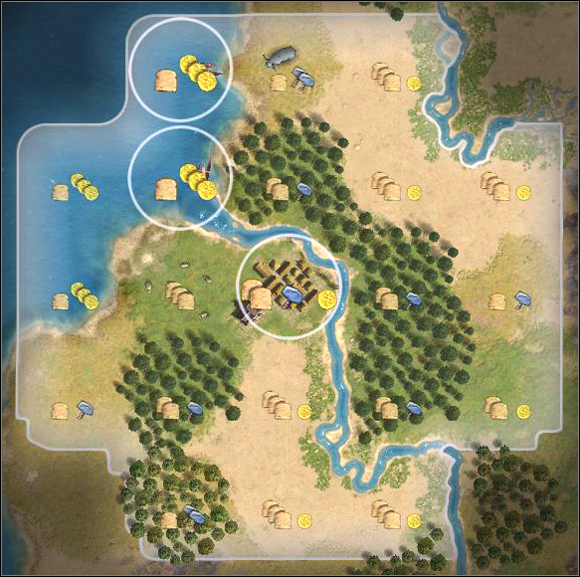
Tiles give Food eaten by citizens, Production used to build different structures and military units and commerce spend on research or put into empire treasury.
Every tile which generates less than 2 Food is slowing city growth because residents working there eat more Food than harvest itself. When the tile isn't generating Food at all, the situation is as if this citizen would have been a specialist - it means that he has to be fed completely by another city resident's work.
This is the reason to aim in at least small surpluses of Food - this makes possible to have specialist and use tiles generating no Food. In this helps Food generated by city itself - it's especially useful when city is small.
In emergency, particularly when you have a granary and huge amounts of Food in city reserves, it's acceptable to allow a few turns of Food deficit when you use your citizens in more important duties.
As a side note - city governors are quite helpful for the people who don't like micromanagement. You can set priorities (emphasise grown, Production, research and so on) and amount of power which governors have and city will be developed without our constant attention. However, I suggest a limited trust and using this tool only in cities without strategic importance.
Basics:
Even if you have the perfect city placement, usually on the first few dozens turns you will aim at balanced developed. In these 20-30 turns you (if there is no another, more important priorities - like war for example) concentrate on growth.
Most important buildings which should be built in every city:
In case of growing unease you have four solutions:
The last two solutions are most powerful. They can even keep order in case of serious unease in all of your cities - but for a decent price.
The Commercial City
The most important tiles are commerce generating ones. Because most of them are Cottages our citizens should work there making Cottages grow. The rest of tiles (with windmills, watermills, mines) can be used when it's necessary.
The key buildings: all increasing Gold income - Marketplace, Grocer, Bank and all increasing research: Library, University, Observatory, Laboratory, Academy.
The Production City
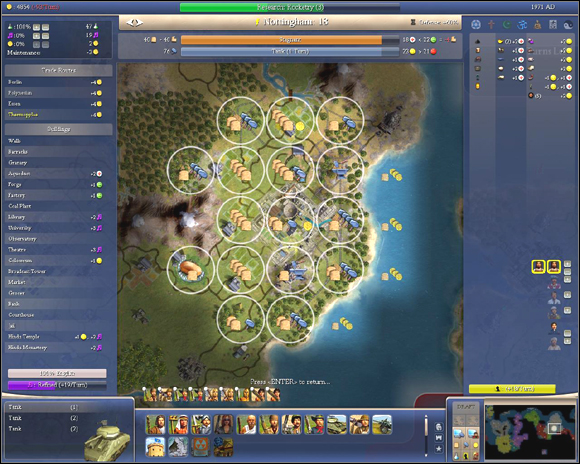
Mines, forests, workshops are the main workplaces of the city's residents. Farms and another Food generating improvements are used only in degree providing a city growth.
Key buildings:
Build other buildings only if you really need them. Most of the time this city should build military units.
The Great People Factory
Food generating improvements are places where citizens of GPF should work. All other you can afford should be changed into specialists. All of them are (expect of course the primary benefits like research, Gold, culture or Production) creating 3 points every turn, used to generate Great People.
To change a normal citizen into a specialist we also need some city infrastructure - buildings where they can by works as specialists:
Engineers: Forge +1, Factory +2, Ironworks (+3)
Scientist: Library +2, Observatory +1, Laboratory +1, Great Library (+2 free scientists), Oxford University (+3)
Artists: Theatre +2, Broadcast Tower +2
Priest: Temple (every +1), Cathedral (every +2), Shire (every +3) Angkor Wat (+3),,
Merchants: Marketplace +2, Grocer +2, Wall Street (+3)
All - The Statue of Liberty +1 free specialist in every city on continent.
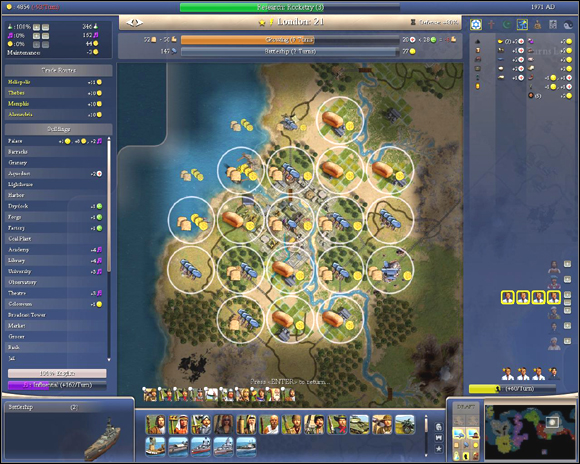
The most useful way of making a lot of specialists is a caste system civic - which enables to change unlimited number of citizens into artists, scientist and merchants.
However, even if we don't have a problem with insufficient infrastructure to back up our specialist, we always should build structures corresponding to specific kind of specialist (for example a Marketplace for merchant) - because as I've said specialists generate huge amounts of cultural/research/income/Production output.
Besides GP points generated by specialists these points are also generated by Wonders:
Great Prophet
Angkor Wat
+2
Chichen Itza
+2
Stonehenge
+2
Shrine
+1
The Oracle
+2
The Spiral Minaret
+2
Great Merchant
Forbidden Palace
+1
Wall Street
+1
The Colossus
+2
The Eiffel Tower
+2
The Great Lighthouse
+2
The Statue of Liberty
+2
The United Nations
+2
Versailles
+2
Great Engineer
Ironworks
+1
West Point
+1
The Hagia Sophia
+2
The Hanging Gardens
+2
The Pentagon
+2
The Pyramid
+2
The Three Gorges Dam
+2
Great Scientist
Oxford Universityl
+1
Red Cross
+1
Scotland Yard
+1
The Great Library
+2
The Space Elevator
+2
Great Artist
Globe Theatre
+1
Hermitage
+1
Heroic Epic
+1
Mt. Rushmore
+1
National Epic
+1
The Kremlin
+2
Broadway
+2
Hollywood
+2
Notre Dame
+2
Rock N Roll
+2
The Parthenon
+2
The Sistine Chapel
+2
The Taj Mahal
+2
In city where generated the most Great People Points is being generated, we should build Heroic Epic Wonders which give +100% GPP in city where is build.
The very helpful thing in maximizing GP generations is civic pacifism gives another +100%
Every city can generating some number of points which after hit a pre-set limit makes a Great Person to been born. After this points in this city are reduced to zero, and in all cities amount of points needed to generate next Great Person are increased by 100.
Every GP is very precious and you need a lot of consideration to figure out how to use him the best way possible.
Great Prophet:
Build the Shrine - if you have a Holy City you can use Great Prophet to build a centre of religious cult. Shrine gives culture bonus and helps to spread religion, but first of all gives a lot of money: +1 Gold for every city where particular religion's believers are present. What is very important - this is working not only for your state religion, so we can earn money on more than one religion.
Super specialist priest create: +2 Production, +5 Gold
Great Engineer
Hurry - this function gives immediately approximately 1000 Production to any building. This makes it possible to finish most of buildings and Wonders in one turn. Very important - Great Engineer can only hurry buildings and wonders, not projects, so most of very advanced structures like spaceships parts or Internet, SDI, Manhattan Project cannot be hurried.
Super specialist engineer create: +3 Production, +3 Research
Great Merchant
Trade mission - this is a very significant money bonus. You send a Great Merchant into a big (the bigger - the better) and distant (the more distant - the better) foreign city. Amount of cash made by trade mission varies on these two factors - that's why it's a good idea to look for the best city to use this Great Person and check a lot of potential places where GM can make his deal. Because income form trade mission is dependent on city size amount of Gold become higher as game proceed. In early-game is usually 700-800 GP, in mid-game good deal is 1500, later it's possible to receive 3500 or even more.
Great Merchant can also work as a great spy - he can come into foreign territory even if we don't have open borders with this civilization.
Super specialist merchant create: +1 Food, +6 Gold
Great Scientist
Build Academy - this building gives the city +50% research bonus. It is very significant - especially in early-game, and if you build Academy in suitable place it is a perfect long-term investment. A suitable place means that city can generate large amounts of research now (due to specialists or lot of commerce) or will be developed as a research centre in the future.
Super specialist scientist create: + 1 Production , +6 research
Great Artist
Great Work or the culture bomb - It instantly makes 4000 culture points, what usually causes a major border change, what can effect in securing access to important resources or foreign border city flips. If you call the culture a peaceful way of expansion, than culture bomb is a peaceful blitzkrieg.
The second gain from the culture bomb is immediately stopping any resistance or riots in the city ad gives city +60% defence bonus - what makes culture bombing extremely useful in time of not-so-peaceful expansion. Making already conquered enemy city's inhabitants your extremely loyal citizens helps a lot when you need a secure base of operation on enemy territory.
Super specialist artist create: +3 Gold, +12 Culture
Every Great Person can be also used in two other ways.
First one is researching technology - major boost of researching one advancement correlated with speciality of our GP. In case of early-game technologies means immediate research of this technology. In situation of medium and late game technologies it is merely a major bonus to research - sometimes useful, sometimes not.
One tip - if you don't like technology that GP can research, because it is very easy to research it in standard way or easy it's to buy from another civilization you simply should do this and after that GP receives a new advance to research.
The second option is triggering the Golden Age - the eight turns time when your Production and Commerce output is significantly enhanced. However usefulness of the Golden Age is limited. It is only helpful in situations when we really need an edge over opponents (like in time of total war or space racing) because usually bonuses are not so significant to justify their costs. Every time you trigger the Golden Age it costs more GP. First it will be only two GP of different kinds, next time three and so on.
As a side note, it is worth to mention that we can also trigger the GA by building a Taj Mahal Wonder - which is much less expensive and far more useful way of introducing Golden Age.
The cities are very important part of Empire - the building block of your state. However, you need something more to build the powerful empire which can survive the test of time. You need to learn how to use them all together.
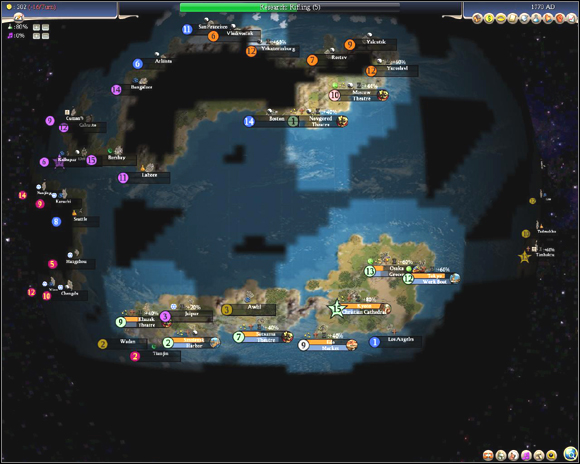
In CIV you don't have few governments with fixed advantages and disadvantages.
You can build your political system from five pieces: government, legal, labor, economy and religion. In every category there are five possible choices - so, finally you have 25 possible versions of governments.
Every choice has some merits and flaws and some of them are better working together than apart.
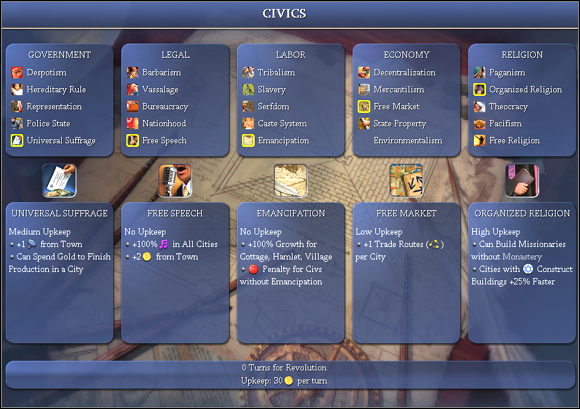
I'll start to analyse from looking close on every civic option, and after that I would like to propose some combinations of civics most useful in my opinion.
Despotism
Require: nothing
Upkeep : low
Default option
Hereditary Rule
Require: Monarchy
Upkeep : medium
Gives +1 happy in city per military unit stationed in the city
A simple way of keeping order in all your cities. Especially useful in early-game when you don't have enough luxuries resources or appropriate buildings/Wonders. Very helpful in case of war - when after conquering enemy city, your armies while healing wounds can keep in this same time an order in new cities.
Representation
Require: Constitution
Upkeep : low
+3 research per every specialist in cities, + 3 happy in our 4 biggest cities.
This is properly one of the most often used government options. The research bonus is huge - but only if you use a specialists. In case of civilization where research is based mainly on scientist specialists this civic almost double scientific output! That's why I used this option whenever I can.
The happiness bonus is also very nice - usually the biggest cities needs extra happy most.
Police State
Require: Fascism
Upkeep : High
Military units Production +25%, war wariness -50%
Used only in case when you are planning a long war and need an edge. I've used it in case of total war, when my aim is to completely destroy big and powerful nation. It's enabling you to produce huge armies, fighting a long war and avoiding serious social uneasiness.
Universal Suffrage
Require: Democracy
Upkeep : medium
+1 Production from towns, can spend Gold to hurry Production.
An interesting choice. Its main advantage is possibility of spending Gold to buy Production in all your cities. This works for all things except projects.
The Gold rush is really expensive making this option usually practical only in emergency.
On the other hand, if we have a lot of Gold and ideally have The Kremlin Wonder (halves price for the buying Production) it's possible to quickly modernise all your cites and armies even if you have the limited Production output. It is very expensive but extremely useful in particular case of when you just researched some critical technology (like assembly line) which can significantly change of situation of your civilization.
Barbarism
Require: none
Upkeep : low
Default
Vassalage
Require: Feudalism
Upkeep: High
+2 xp for every new military unit, some additional free units
This is one of two options improving experience of our military units. +2 xp is a really useful perk, it gives new units an extra promotion (without barracks) or two extra promotions (with barracks). It's most useful when you build a lot of military units.
Bureaucracy
Require: Civil Service
Upkeep: Medium
+50% income, +50 Production in capital
One of my favourite civics. Huge boost of capital is most valuable in early-game, when capital is notably much more advanced than rest of your cities. When in medium-game you have a lot of highly developed Cottages the free speech becomes interesting alternative. Hoverer even in late-game in some situations this can be the best legal option.
Nationhood
Require: Nationalism
Upkeep: low
+2 happy in city with barracks, can draft citizens
Most useful in case when we are suddenly attacked or we see that war is quickly approaching and don't have an army big enough. The draft can save our lives making possible to create an army very fast - but the price is quite high (-3 happiness and - 1 size in city for one unit) and military units created this way are relatively inexperienced.
+2 to happiness helps keeping an order when drafting citizens - but usually this bonus only is not enough.
Free speech
Require: Liberalism
Upkeep: none
+2 commerce form every town, +100% culture
Huge boost of culture and commerce - the latter only if you have a lot of towns.
Usefulness of this option is heavily dependent on number of Towns (most advanced version of Cottages) and usually you have to carefully consider whether it isn't better to keep bureaucracy after all.
Bonus to culture is more generally functional - if you use a culture as a tool of expansion it is an obvious choice.
Tribalism
Require: none
Upkeep: low
Default
Slavery
Require: Bronze working
Upkeep: low
We can hurry Productions scarifying city population
Not very often used - this way of hurry Production is rather expensive and makes some social uneasiness. In emergency can by handy, also used if you have a really quick growth and some population loses are acceptable.
Serfdom
Require: Feudalism
Upkeep: low
Workers build improvements 50% faster.
Useful in specific situation - when you have a lot of improvements to build and don't have enough workers - for example you repairing war destructions or already research important advancement which gives some valuable worker's option (like Railroad)
Caste System
Require: Code of laws
Upkeep: medium
Unlimited number of artists/merchants/scientists
Probably most often used civic option. No limits of specialists' numbers can be very useful despite of your way of development. 80% of game time I use this option.
Emancipation
Require: Democracy
Upkeep: none
Doubled speed of Cottages, Hamlets and Villages growth, negative influence on happiness of civilizations without emancipation.
Not very often used, even if +100% to cottages grown is quite nice. Penalty for the other civilisations is not so important - it heavily dependent on how many other civilizations choose this civic. The biggest drawback of this option is that you cannot use a caste system - and that's why a usually avoid emancipation. The caste system is better in almost every situation.
Decentralization
Require: none
Upkeep: low
Default
Mercantilism
Require: Banking
Upkeep: medium
+1 free specialist in every city, no foreign trade routes
Really strange option - one where drawback (no foreign trade routes) are usually much more significant than advantages (free specialist)
Can be used only if you don't have a profitable trade route with your neighbourhood (for example we avoid the open borders with everyone) - and in this case a free specialist are really helpful.
Hoverer in most situations losing the most profitable trade route just for the advantage of one specialist is a rather poor trade-off.
Free market
Require: Economics
Upkeep: low
+1 trade route in every city
One of the most useful options. Commerce from trade routes (especially in coastal cites) are noteworthy and important - and new trade route is really nice.
State Property
Require: Communism
Upkeep: none
No maintenance cost from distance to palace, +1 Food form workshop and watermill.
Very interesting although specific choice. Except significant cities cost reduction its gives an option to indirectly improve your Production output. The Food bonus makes possible to swarm your grasslands with workshops because this improvement lost its biggest disadvantage -1 to Food, but keeps +4 Production bonus (when we research Communism we already have maximum profits form Workshop).
This requires not only proper technology but also a lot of preparation and put your civilization on a rather narrow patch of development if you like to use full potential of this option.
However if you plan a global military conquest State Property will be our best friend.
Environmentalism
Require: Ecology
Upkeep: high
+6 health in all cites, +1 happy per every forest and jungle in the city reach.
Helps in cities grown in advanced game - boost to health is huge, but usually not very effective. This civic is available very late in the game, when you typically have a lot of health resources, your biggest cites have many buildings helping in growth, and with Ecology we get a recycling centre - building which reduce to zero negative health bonus made by other buildings. This civic can be useful only if health is a major problem of your civilization, in other cases - I don't see the point of use it
Civics from this group require to work presence of state religion in city. Exception from this rule are paganism and free religion.
Paganism
Require: none
Upkeep: low
Default
Organized Religion
Require: Monotheism
Upkeep: High
+25% building Production, possible to build missionary without monastery
A very useful and early available option. Bonus to building Production works also in case of Wonders and easy access to missionary helps very much in quick spread of religion. One drawback is the cost of this civic.
Theocracy
Require: Theology
Upkeep: Medium
+2 xp for every build military unit, no non-state religion spread
Like vassalage, it gives additional experience to military units - but does not require the resignation from bureaucracy. That's why it should be far more often used when you are looking for bonus experience.
Pacifism
Require: Philosophy
Upkeep: none
+100% GP points in all cities, +1 Gold support cost per military unit
Bonus for Great Person points is huge - without any other additions it gives two times more GP! If you based your strategy on use of GP this civic is must-have.
However the extra cost of units support makes any war (except of defensive one) extremely costly.
Free Religion
Require: Liberalism
Upkeep: low
No state religion, +1 happy per every religion in city, +10% research in all empire
Quite interesting alternative for the other religious option. Useful in two situations:
1. Research Powerhouse
The main drawback is the need of representation which is usually available in late-game. That's why your main objective is to build The Pyramid Wonder or to get city with it. It's not always easy - but if properly planed possible even on higher difficulty levels.
The research of Code of laws is also possible quite early (sometimes with help of The Oracle Wonder) - and core of your system is already working.
The main advantage of this combination is the best research output in the game - making your science specialists really efficient.
2. The War Government
This combination is very flexible - most of the elements are optional. The only key element is either vassalage or theocracy. You introduce other options only if need them.
When planning a short war it is enough to take the theocracy and keep the rest of the options without any changes. As I've said, the bonus XP and barracks help a lot in creating stronger army.
If the war is looking to be longer or more demanding you take other XP giving civic - so usually it is a vassalage - and enjoy a quick gain on third promotion (after initial fights) of all our units.
Only if you face the total war, or you see that war will be very long and hard, it's reasonable to change all civic to prepare for this:
The drawback is a cost (2x high upkeep option) and no research helping civics.
3. Quick development
Third system is based on assumption of maximizing the development. Useful if you have to like to take good position in technological race or have to rebuild after a devastating war (pillaged improvements, too low technological level, not enough important buildings in cites etc.)
There are 7 religions in this game - each one is achieved by the civilization that first researches the proper advancement:
Three first (Buddhism, Hinduism, Judaism) can be founded quite fast, the next three (Christianity, Confucianism, Taoism) require some more time but can be quickened using The Oracle Wonder. The last one - Islam - is discovered last. If you want to become a religion founder - first three are really hard to take before AI discovers them (on higher difficulties), but the rest, if you really like to find one of them, are almost always easy to take before your competitors. Islam can by treated like "last chance religion" - if you can't discover the rest, this one is usually easy to take - but will require the lot of time commitment.
The main question is if you really need to find a religion ourselves? It depends. The main drawback is the amount of time and research points to spend to become a religious founder. This is a usual situation in Civilization 4 - to find what kind of research patch are the best for achieving your goals. In this case research of religious techs is usually connected with neglecting other advancements and can have serious impact on our chances of winning.
So, what are the advantages of becoming a religions founder?
There is one - a Holy City
The Holy City is a centre of particular religion and civilization which controls it has a major impact on the destiny of this particular religion - choose how and where spread the religion. However, what's more important, Holy City (after building a Shrine there) can generate huge amounts of Gold +1 for every (also foreign) city where religion is present, and guaranteed (if this particular faith is your state religion) a line of sight with all these cities.
Money income from religion is a really nice addition to your budget - and sometimes can make it possible to play the entire game on 100% science. The line of sight is also very useful - giving you the information about city garrison, level of advancement of particular civilizations and information about military forces' movements.
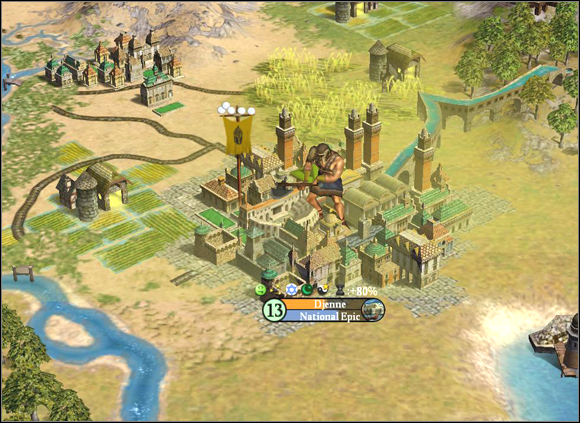
Apart a Holy City, second important element of the religion system in CIV is a state religion - this is the religious belief which you chose to be followed officially by your state. Only this way you can use most of the religious civics and receive the line of sight when you have a Holy City of your state religion. This is possible to have a state religion without Holy City, or with Holy City of another religion - but the you have most advantages when have both.
The most important effect of religion is how it impacts diplomacy. The more information about is in Diplomacy chapter, here I would like to write how to make your religion the most influential one.
First of all - you have to spread religion as far as you can. There're two ways of spreading - one is passive, when faith slowly spreads from city where it is known to other ones, connected with the previous with trade routes. As I said it is a very slow way (only way to quicken it is to build a Shrine). The second - active way of spreading is use of missionary. This unit can attempt to convert any city even if there's another religion present.
Only way of blocking this unit is to choose theocracy civic or to close border with civilization which sends a missionaries.
If you convert even one of the cities of another civilization there are chances that it can change religion on your faith. The more cities you converted - the change gets more probable. However, it isn't so easy as its look like. First of all, not only your civilization tries to spread religion, and AI will choose this religion which is more profitable (mainly in AI city development and in diplomacy). So, not only you need to make other civilization share your religion but also to make them keep it.
Is it possible to avoid the religion, don't have a Holy City, and don't choose a state religion? It is, but usually drawbacks are more serious than gains.
Let's starts with advantages:
There is only one drawback - when we choose one religion, civilizations with other religious believes are become more hostile to us. This makes a religious choice strongly connected with diplomacy.
Diplomacy engine is based on a system of positive and negative factors which make AI Leaders more or less friendly towards a player. Every diplomatic action has a reaction - and you can see all the time the summarized effect of all your actions - with point value of every one of them. Positive value (green one) is good, while negative (red) is bad. If summarized effect is positive AI rather likes you, if it's negative - as you can guess, AI doesn't like you at all.
There are lot of factors in this system, but due to detailed info how the relationship between AI and you look like you now know not only is it friendly or not, but you also why he hates/loves you.
What is very important - these relationships are connected with your associations with other Leaders - often waging war with correct enemy or avoiding trading with the wrong civilization makes your diplomacy much simpler. One of the most important factors of relationships is religion - civilizations with this same state religions tend to like each other and don't like a unbelievers.
Every Leader has unique personality and behaves differently - Montezuma is a crazy, unpredictable person who can go to war with you without any apparent reason, Ghandi is opposite - an easy going, friendly AI, looking for cooperation and avoiding war whenever possible. These personalities also react differently on this same factor - for example Isabella is extremely interested in religion issues, while Mao is rather indifferent in what you believe.
As usual in this game, also in diplomacy you should define your own goals. What should be taken into consideration?
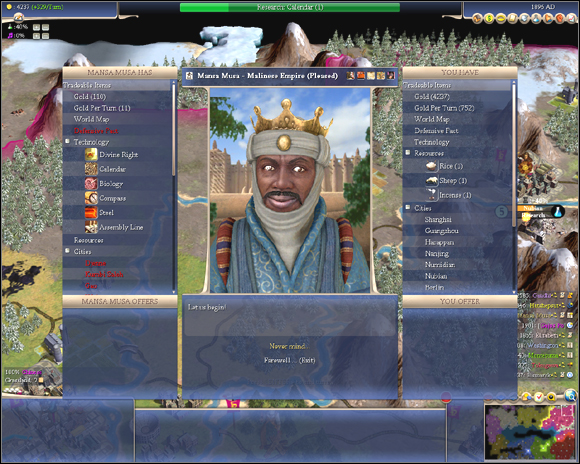
One more, very important thing - although AIs are reasonably trustworthy (except Montezuma) the most they respect is power. If your army is many times smaller than your neighbours, most of them aren't able to resist an easy prey.
The money is (except your army and advanced science) one of the most powerful tools you have at your disposal. That's why you should do everything possible to have enough of it. Like in real life, it isn't an easy thing.

The main tool of control where our commerce goes is the global slider. Commerce is used in three main regions: Research (science), Gold (income) and Culture. Usually the most commerce goes into Research - because the technological advancements are most important, but some part always goes also into remaining two areas - culture and income.
How to earn money?
Holy City and Shrine - predictable and stable source of income. What is very important, if we have a Shrine of faith that is not our state religion we loose the line of sight but receive the cash. It's possible to have, i.e. three Shrines and all of them will generate nice amounts of money;
Merchants (specialists) and buildings increasing a Gold output - Marketplace, Grocer, Bank and Wall Street;
Great Merchant and trade mission - One-time but huge pile of Gold;
Build a lot of cottages and make them grow into towns, research printing press, choose free market and free speech and maximize number of international trade routes.
How you loose it?
Civics - every civic has an upkeep cost: none, low, medium and high - the exact amounts of Gold are dependant on civilization size - the bigger nation and more expensive civics - the higher costs goes;
Army - some of the units are free but most of them need money to exist. Additionally you pay much more when going to war - support costs depends on how big army is and on what terrain (within enemy border is most expensive) military units fight;
City maintenance - you pay for the cities not buildings. Costs are dependant on distance from capital (or other government centres - like Forbidden Palace or Versailles) and overall number of cities;
Inflation - some amounts of money which you are loosing every turn. Not a very significant one - but quite annoying.
The tech tree in CIV is quite big - 86 technologies do not make it the biggest one in the series, but what is worth mentioning all technological advancements are useful and give significant advantages.
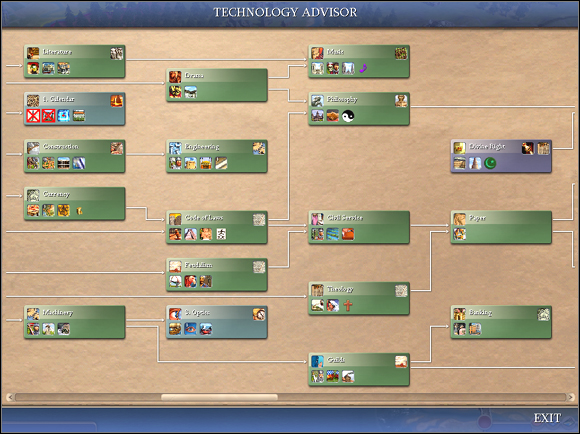
The most important feature of Civilization IV tech tree is flexibility:
On the other hand there're three factors limiting research flexibility:
Because what and when you need to study is different in almost every game, it is impossible to give precise advice about research strategy. Here I put some more general suggestions helpful in deciding what path on technology tree to choose:
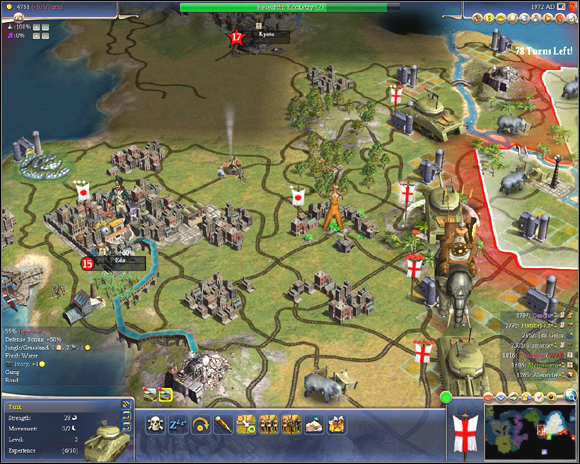
War is an inevitable part of every CIV game - even if you try to avoid it, AI can always have another plans. As usually, the war requires some careful planning and precisely defined goals.
What we should keep in mind:
Of course this is not a closed list - there is much more to consider, but this can help as illustration of fact that it is not an easy decision to go to war. It's really simple to loose a game because you start the wrong war in the wrong time.
That's why it is also important to know when time comes for the war to end. In perfect situation it can be a moment when we accomplish our goals, but sometimes, when things go wrong, it is good idea to pay the enemy even huge a price to free ourselves from an already lost war.
Peace gives always at least 10 turns of safety which can by used on preparing to the next stage of war or to find suitable allies to make more powerful enemy less dangerous.
The war engine is based on these factors:
Unit strength (STR) - most obvious factor on which all further calculations are based;
Defender terrain influence - hills give +25%, forests +50% (so both hill and forest gives +75%). If attackers have to cross the river when attacking, defender has another +25%. So someone who is defending on forest hills across the river have +100% from terrain only;
Special Unit features - most of units have some bonuses against another type of military units. This creating well known from RTS "rock-paper-scissors" rule. What's very important these bonuses are adding up with those from promotions;
Fortify defender - for every turn after fortify order defender receive +5% do STR up to 25%. This bonus is lost after unit moves;
Bonuses from unit promotion - they stack with those from unit features, for more info - see below;
Casualties from previous fights - casualties are directly influenced on unit STR, so in extreme situations a modern tank (most powerful unit in game) can be easily beaten by a warrior (the weakest unit).
War engine was created with strong emphasis on idea of combined arms - and that's why you should combine your forces making a strike group built from different types of units. Well built strike group contains of a few (not more than 5-6) units which can fight with most types of enemy forces. <br>The must-have is to include one unit with medic promotion - this helps a lot in staying alive deeply in enemy territory. You have to be aware that putting more units into stack is quite dangerous when enemy has catapults (or other units doing collateral damage) - that is why the usual maximum is 5-6 units per strike group.
In case of small-scale, early-game war your forces can have only one group. In medium-game war that's usually 4-5 groups working together. In case of late-game total war it can be more than 20. Besides avoiding extra damage done by catapults, splitting forces into dozen battle groups helps to controlling entire battlefield and makes difficult for enemy to get around your forces and strike at your territory.
Promotions are available for units which receive experience in combat. First promotion is available with 2 XP, next is 5 XP, 10 XP 17 XP and so on. All bonuses from promotions stack together with those from units' features. What's also important, units keep promotion even when they are upgraded - what's making them even more useful.
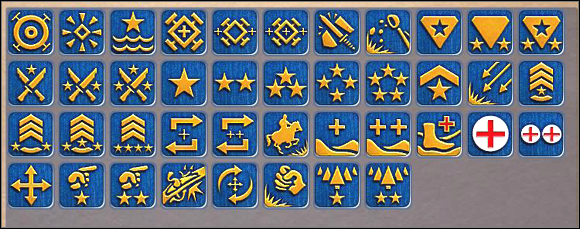
Promotions can by divided into 3 groups:
How civilizations are prepared for war depends on four main factors:
Of course I'm aware that none of the above is new for most players, although it shows well that at war you can attack not only military forces of the enemy, but also other building blocks of his military might.
The basic tool to do this is called a plunder. This is a nice option which destroys enemy's improvements, destabilizing his economy, Food and Production output, harming him seriously even if we can't destroy any of his units or take any of his cites. The plundering not only destroys enemies' land but also gives us a small amount of Gold.
The other kinds of indirect attack worth mentioning are diplomacy (more above), razing some of carefully picked cites and keeping your forces near enemy cities in well defended positions which usually makes AI unable to start repairs of damage done by your pillagers.
There are 26 leaders in game - every one has his unique combinations of traits, technologies and UU. The traits have the most significant influence on gameplay - other bonuses are rather limited - starting technologies are only important in first 100 turns, UU - has usually rather short time of usefulness (however - it's sometimes can be enough to significantly alter the course of play).
The traits are not equal - some of them are more powerful in early-game (Creative), others are more useful in specific situations (Organized), but most are helpful from start to end. However, all give significant advantages if used correctly.
Aggressive
Free combat I promotion for all melee and gunpowder units
Perfect for warmongers even if this promotion is received only by some of your units (only melee and gunpowder). The combat 1 promotions don't look very powerful - it's only +10% to STR. But you have to remember that is a free promotion - so it means that next promotion will be at 2XP, next 5XP and so on. And what's also very important - combat I gives (after earning 2 XP) instant access to some very useful promotions from the start (like cover, shock, medic) and significantly helps accessing more advanced promotions (march, commando)
Halved costs of Barracks and Drydocks are nice addition that helps more in receiving additional experience.
Creative
+2 culture in every city
Priceless in early-game. All your cities quickly expand borders (five turns into first culture radius grown, 40 into next stage) and fast received a defense bonus - without any other investments (monuments, Stonehenge Wonder, religion). This gives a huge advantage especially in first 50 turns, greatly helping in securing resources and land-grabbing. In medium and late phases of the game it becomes much less useful. If you used it well, however, you will have a serious advantage for the rest of game.
Halved costs of Theatre and Colloseum helps in keeping order in cites, and make a possible to build very quickly Theatre in every just build or conquered city - helping in even faster culture development of new cities.
Expansive
+2 health in all cites.
Nice, especially on higher difficulty levels, when there is less "free" health in all your cities. Helps in making your cities even bigger - works like extra aqueduct.
Halves cost of Harbor and Granary. The former is only useful in coastal cities but the latter is built in every city and helps a lot in city growth.
Financial
+1 to commerce on titles already generating at least 2 commerce.
Very powerful trait - every Cottage near rivers, coastal tiles, watermills or windmills is generating extra commerce. Extra commerce means many extra research or extra income. Very nice, indeed.
Halved costs of Bank - even more money.
Industrious
+50% to Wonder Production
Do you like Wonders? You hate it when someone builds your favorite Wonder before you? Stop this! Take this trait. Useful from start to finish. It stacks with bonuses from strategic resources - making Wonders relatively cheap.
Halves cost of Forge. One of the most useful buildings - extra +25% Production in city available in your cites in halved time.
Organized
-50 % civic upkeep
A controversial trait - lot of people consider it broken. In my experience is really useful - but only in specific situations. Ideal for a person who is planning to manage a world spanning empire with a lot of cites.
Civics upkeep is strongly connected with size of civilization here -50% gives you a lot of freedom when it comes to choosing your favorites civics.
Halves cost of Courthouse and Lighthouse. This is even more useful. Now Courthouses are really cheap and can be built as first buildings in cities due to very short construction time. In long-term this can result in some serious savings. Cheap Lighthouses are also helpful - but only in coastal cites.
Philosophical
+100% Great Person points.
Greatly improve amounts of GP points - without addition bonuses doubles it giving you a two times more Great People. If you based your strategy on GP - it is a must have. Possibly the most useful trait of all.
Halved costs of University - very nice, because this is a rather expensive building. Cheaper means you will have much more of them, and that means that your science will be much more advanced.
Spiritual
No anarchy
When changing your civic you will not loose turn on anarchy. Effect - more flexible social system. You like theocracy right away - you have it, you like pacifism - ok, here you are. No anarchy between. Hoverer, it's less powerful than it looks like, due to 5 turn time before you can make any other change - what significantly limits usefulness of this trait.
It's simply a few turns advantage over competitors - turns which are not lost because of anarchy. It can help (sometimes you can win only due to a few turn advantage) - but definitely this trait is not as strong as it looks like.
Halved costs of Temples - much more useful that no anarchy. Temple is one of this few building that can be build in city more than once - every time for every religion. If you based your strategy on religion, that can help a lot. Cheaper Temples mean much more culture, priests, specialists, more happy citizens. More Temples gives opportunity to build even more Cathedrals in medium-phase of the game.




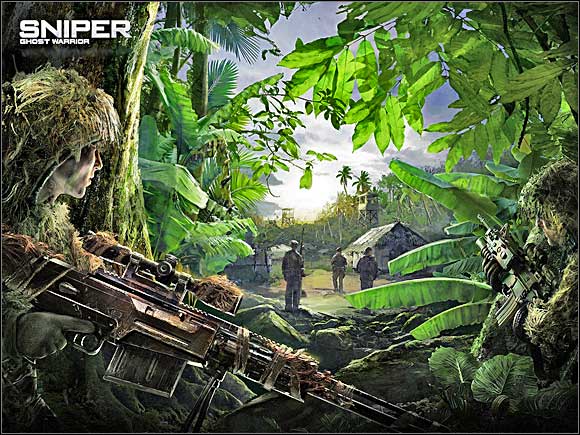 Sniper: Ghost Warrior Game Guide & Walkthrough
Sniper: Ghost Warrior Game Guide & Walkthrough Sniper: Ghost Warrior 2 Game Guide & Walkthrough
Sniper: Ghost Warrior 2 Game Guide & Walkthrough Star Wars: Empire at War Game Guide & Walkthrough
Star Wars: Empire at War Game Guide & Walkthrough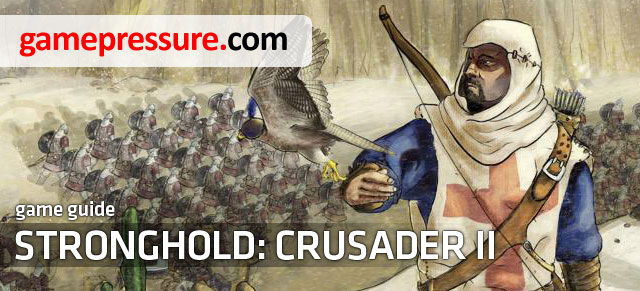 Stronghold: Crusader II Game Guide & Walkthrough
Stronghold: Crusader II Game Guide & Walkthrough Saints Row IV Game Guide & Walkthrough
Saints Row IV Game Guide & Walkthrough